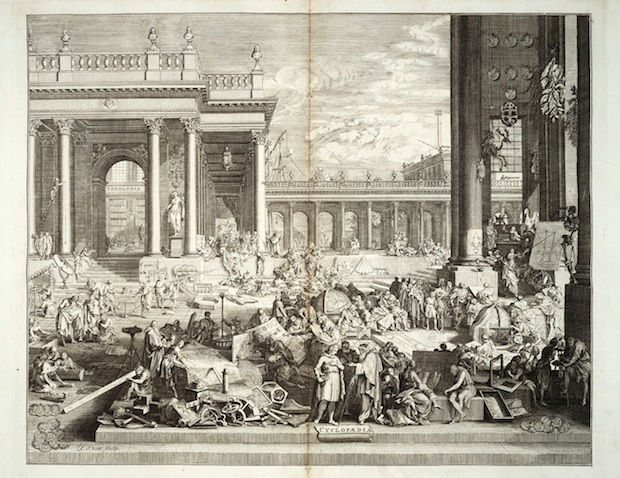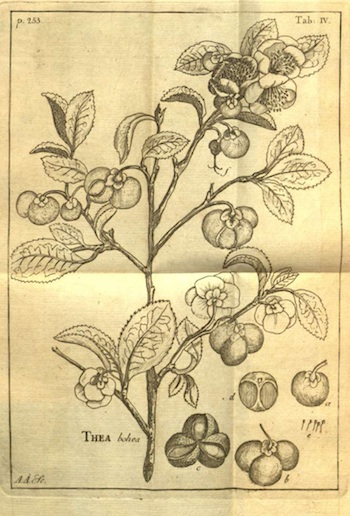|
FEATURES
Tea in Ephraim Chambers' <i>Cyclopedia</i> | China Heritage Quarterly
'Strangely Controverted'
Tea in Ephraim Chambers' Cyclopædia [1728]
The article below is taken from one of the first general encyclopedias to appear in English, Ephraim Chambers' Cyclopædia, or, An universal dictionary of arts and sciences, published in London in 1728.[1] The great French Encyclopédie of Denis Diderot and Jean le Rond d'Alembert had its origins in an abortive translation of this work. The Cyclopædia's account is characteristic of the combination of fact and fancy that troubled the European understanding of tea until Robert Fortune's journeys into the Chinese interior during the 1840s. For excerpts of Fortune's own accounts of those expeditions, see here and here.—The Editor
TEA, or, as the Chinese call it, Tcha, the Leaf of a Tree or Shrub, growing in several Provinces of China, Japan and Siam.
The Tea Plant affects Valleys, and the Feet of Mountains, and a stony Soil. Its Seed is usually sown in Places expos'd to the South; and bears three Years after sown. The Root resembles that of the Peach Tree: The Leaves are green, longish at the Point, and pretty narrow, an Inch and half long, and jagged all around. The Flower is much like that of the wild Rose. The Fruit is of different Forms, sometimes round, sometimes long, sometimes triangular; of the ordinary Size of a Bean; containing two or three Peas, of a Mouse Colour, including each a Kernel. These Peas are the Seeds by which the Plant is propagated.
The Tree is of various Heights, from one Foot to an hundred: Some there are which two Men can't fathom, while others scarce exceed the feeblest Shrub in a Garden.
The best Time to gather the Leaves of Tea, is while they are yet small, young, and juicy: When gather'd, they are pass'd over the Smoak of boiling Water to moisten them; then they are laid on Copper Plates, which are heated; and thus, the Leaves drying, they curl up in the Manner they are brought to us.

Fig.1 Frontispiece of Ephraim Chambers' Cyclopædia
�
'Tis very rare to find Tea perfectly pure; the Chinefe always mixing other Herbs with it, to increase the Quantity. Indeed, the Price 'tis sold for among them is moderate enough; usually 'tis about Three-Pence a Pound Sterling, never more than Nine-Pence.
The Chinese know nothing of Imperial Tea, Flower of Tea, and many other Karnes, which in Europe serve to distinguish the Goodness, and the Price of this fashionable Commodity; and yet beside the common Tea, they distinguish two other Kinds, viz. the Voui and Soumlo, which are reserv'd for People of the first Quality, and sick Folks.
We have three Kinds of Tea in Europe, viz. Green Tea; which is the common Tea of the Chinese, &c. F. le Compte calls it Bing Tea, and says 'tis gather'd from the Plant in April.
'Tis held very digestive, and a little corrosive: It gives a pale greenish Tincture to Water; and its Leaves are much twisted.

Fig.2 Thea bohea, from Carl Linnaeus, Amœnitates academicæ, vol.7, p.160, t.4 (1769)
The second is Bohea Tea, which is the Voui Tea, or Bou Tea of the Chinese. F. le Compte makes this only to differ from the Green Tea, by its being gather'd a Month before it, viz. in March, while in the Bud; and hence the Smallness of the Leaves, as well as the Depth of the Tincture it gives Water. But 'tis much more probably the Tea of some particular Province; the Soil being found to make an Alteration in the Properties of the Tea, as much as the Season of gathering it.
'Tis all bought at Nanquin; and it is but lately that the Dutch have introduced it into Europe, where it begins to be much in Vogue.
The third is Red Tea, or Tartar Tea, or Honan Tcha, which tinges the Water with a pale Red, and which is said to be extremely digestive: By means hereof, it is that the Tartars are laid to be able to feed on raw Flesh. Its Taste is Earthy; and much the least agreeable of them all; but little known in England.
Tea is to be chosen Green, of the briskest Smell, as whole as possible; and the greatest Care taken that it han't been expos'd to the Air to pall, and evaporate.
The Drink, Tea, is made in China, and throughout the greatest Part of the East, after the same Manner as in Europe; viz. by infusing the Leaves in boiling Water, and drinking the Infusion hot. Indeed, among us, 'tis usual to temper its Bitterness with Sugar, which the Orientals use little or none of.
However, the Japanese are said to prepare their Liquor a somewhat different Way, viz. by pulverizing it; stirring the Powder in hot Water, and drinking it as we do Coffee.
The Chinese are always taking Tea, especially at Meals; 'Tis the chief Treat wherewith they regale their Friends. The most moderate take it at least thrice a Day; others, ten times, or more: And yet 'tis computed, the Consumption of Tea among the English and Dutch is as great in Proportion as among the Orientals. In France, the Use of Tea is much declin'd, and Coffee is now become the prevailing Liquor.
As to the Properties of Tea, they are strangely controverted : The Eastern Nations are at least as much possess'd with them as the Europeans ; but 'tis, perhaps, because Imagination bears as great a Sway there as here. The Reason why the Gout and Stone are unknown in China, is ascrib'd to the Use of this Plant; which is said further to cure Indigestions of the Stomach, to carry off a Debauch, and to give new Strength for Drinking, to dispel Wind, to cure the Vapours, &c.
Sim. Paulli, Physician of the King of Denmark, in an express Treatise on this Plant, endeavours to shew, that these Virtues ascrib'd to it in the East, are local, and don't hold with the Inhabitants of Europe. He holds, that those past their 40th Year should never use it, as being too desiccative; That Tea has no other Virtues but those of Betony: And adds, with Bauhin, that 'tis only a Species of Myrtle found in Europe as well as the Indies.
But this Opinion is refuted by Pechlin, in a Treatise of Tea, intitled, Theophilus Bibaculus, sive de Potu Theae Dialogus ; Where he maintains, That 'tis good to prevent Scorbutic Diseases ; that its gentle astringent Virtues strengthens the Tonic Motion of the Intestines, &c. But he blames the Drinking it with Milk; and especially after a full Meal, or after much Wine.
Notes:
[1] The work's full title is Cyclopædia, or, An universal dictionary of arts and sciences : containing the definitions of the terms, and accounts of the things signify'd thereby, in the several arts, both liberal and mechanical, and the several sciences, human and divine : the figures, kinds, properties, productions, preparations, and uses, of things natural and artificial : the rise, progress, and state of things ecclesiastical, civil, military, and commercial : with the several systems, sects, opinions, &c : among philosophers, divines, mathematicians, physicians, antiquaries, criticks, &c : the whole intended as a course of antient and modern learning.
|